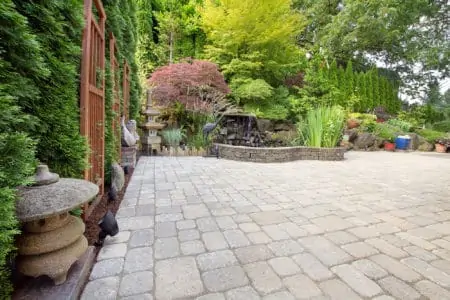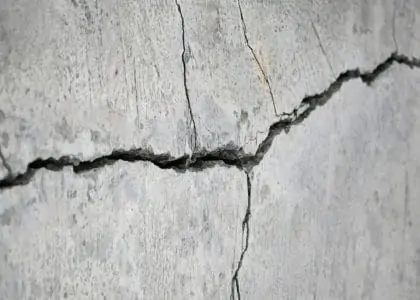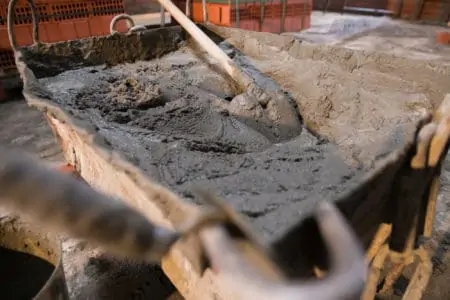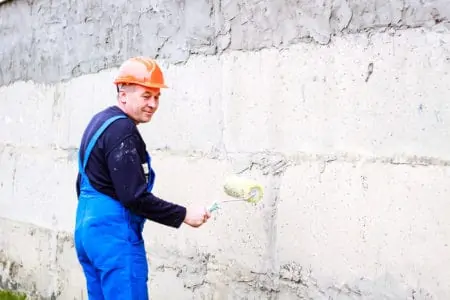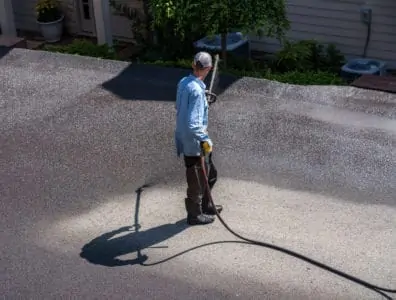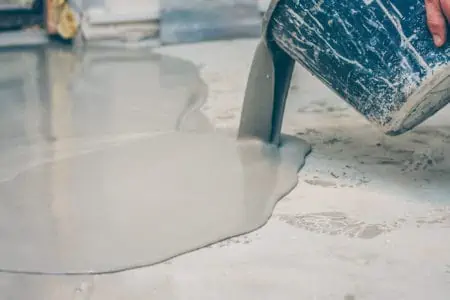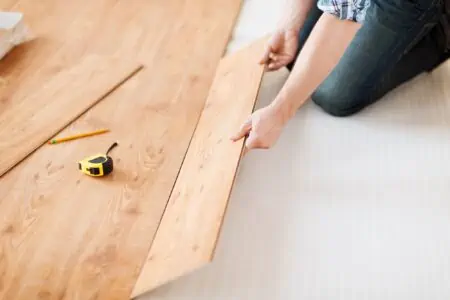Sealing your pavers preserves their life and protects them from mold, mildew, UV rays, and water damage. The best paver sealers also lock the pavers in place, seal the joints and enhance the cosmetic look of the stones.
Here is our take on the 5 best paver sealers money can buy and why we like them. Plus, we look at what they are good at and if they are value for money.
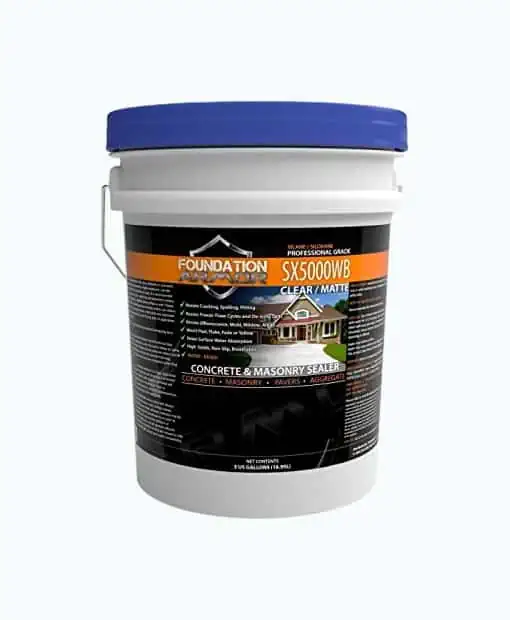
- Breathable to let the trapped moisture escape
- Penetrating sealer protects from beneath
- Gives 95% protection against water
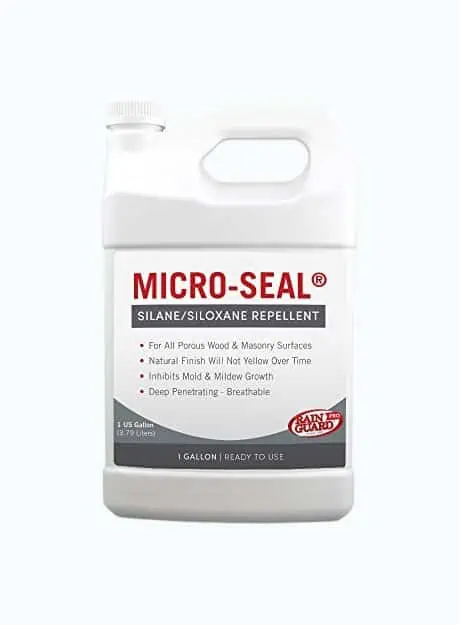
- Breathable to allow moisture to escape
- Dries to a natural finish & won’t yellow
- Water-based, so better for the environment
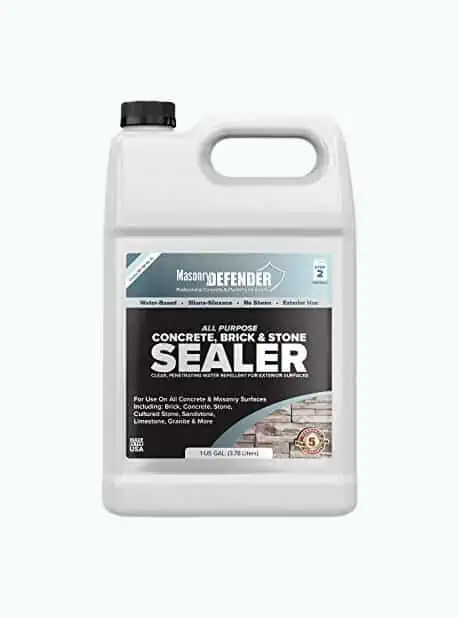
- Works on almost every surface
- Water-based, so low VOCs & odors
- 100% breathable to release trapped moisture
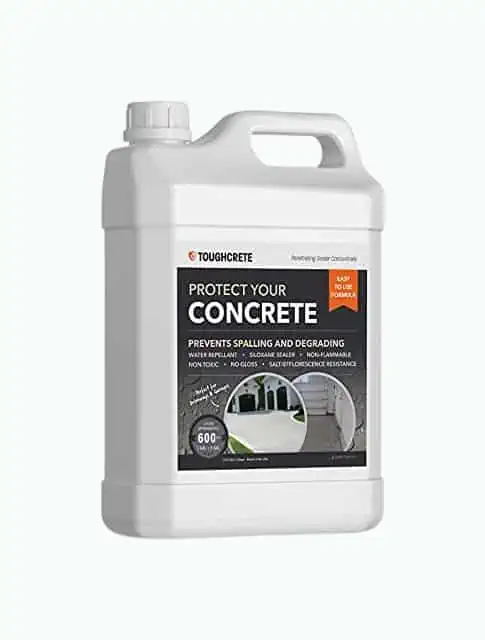
- Breathable to allow trapped moisture to evaporate
- No gloss, fade, & non-flammable
- High solids content forms watertight protection
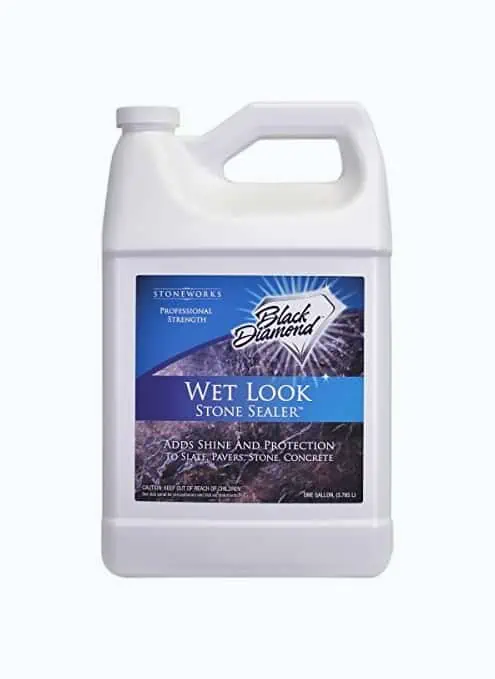
- 30-minute drying time between coats
- Maximum of 500 sqft of coverage
- Resists chemicals & UV rays
Review Methodology: At Sensible Digs, we put our professional experience to work, conducting hands-on evaluations and thorough analysis of the best paver sealers on the market. Our assessments are built on solid data and research, ensuring that we provide you with accurate, fact-based results. We compare products, rank their performance, and measure their effectiveness based on key decision-making factors, including durability, ease of application, and finish quality. Our reviews are designed to help you understand what sets each sealer apart from its competitors, evaluating from a user’s perspective. Our aim is to help you make informed decisions, backed by our expert advice and first-hand evidence.
The Best Paver Sealers of 2024
Having scoured the internet for the best paver sealers, we are confident we have the definitive list. Here are our top 5.
Foundation Armor SX5000 Water-Based Silane Penetrating Paver Sealer
Best Water-Based Paver Sealer
If you are looking for the ideal water-based sealer, this Foundation Armor penetrating sealer is perfect. It contains 5 times more active ingredients than its competitors, and it is breathable, meaning moisture trapped inside the pavers can evaporate.
It will not change the look and feel of your stonework, and it is guaranteed to give you 95 percent moisture resistance, which reduces water damage like pitting, cracking, and spalling.
Because this is a penetrating sealer, it doesn’t leave a visible film, with all the protection taking place beneath the paver surface, and if it is applied correctly, it can offer up to 10 years of protection.
Just 1-gallon covers 175 square feet, and it can be applied using a sprayer, roller, or brush. Foundation Armor recommends leaving your pavers for 24 hours so the sealer can cure, and because it is a water-based product, it is low in VOCs and better for the environment.
The only negative is it comes in a 5-gallon tub, so unless you need that much, it could be a waste of money buying that much. If you only have a small area that needs sealing, go for a smaller quantity.
Pros
- Breathable to let the trapped moisture escape.
- Penetrating sealer protects from beneath.
- Gives 95 percent protection against water.
- Up to 10 years of protection.
Cons
- It costs a lot if you only have a small project.
Product Specs
| Quantity | 5 gallons |
| Coverage | 175 square feet per 1-gallon |
| Type | water-based |
| Drying time | 24 hours |
| Price | $$$$ |
Our Ratings
User Experience
Rain Guard-CR-0356 Micro-Seal Penetrating Water Repellent Sealer
Best Paver Sealer for Pool Deck
Your pool deck pavers get a lot of punishment, especially from moisture, so you need a sealer that can handle mold and mildew growth as well as penetrate deeply to protect from within.
This Rain Guard is suitable for most porous surfaces, including wood, and it is breathable, so when your pool deck gets wet, it allows all that trapped moisture to escape. It dries to a natural finish and is guaranteed to not yellow in the sunlight.
This product also protects your pavers against salt spray and ice removal agents, and because it is water-based, it is easy to clean up and non-damaging to the environment. It also has a low odor, so you don’t suffer from headaches and nausea while you spray it on.
It only takes 60 minutes to dry between coats, but you have to wait 7 days for it to fully cure before using the pavers; however, from this 1-gallon container, you get 300 square feet of coverage.
Pros
- Breathable to allow moisture to escape.
- Dries to a natural finish and won’t yellow.
- Water-based, so better for the environment.
- 300 square feet of coverage from 1-gallon.
Cons
- It takes 7 days to fully cure.
Product Specs
| Quantity | 1-gallon |
| Coverage | 300 square feet per 1-gallon |
| Type | Water-based |
| Drying time | 7 days |
| Price | $$ |
Our Ratings
Personal Perspective
Masonry Defender All-Purpose Brick and Stone Sealer
Best Brick Paver Sealer
Your brick pavers are extremely porous, so applying 2 coats of this all-purpose sealer will give them the best chance possible. Because it is a water-based sealer, it is better for the environment and low in VOCs, so the ozone is better protected.
It also cleans up easier and has fewer odors, unlike solvent-based products that induce nausea, headaches, and sore eyes and throat.
This sealer works on most surfaces like brick, concrete, and stone, and it is 100 percent breathable, so it doesn’t trap in moisture, which causes mold and mildew.
It dries to a no-sheen finish, so it won’t change the original color of the driveway, but you only get 150 square feet of coverage, which is not that great when you compare it to other products. And the range drops further depending on the porosity of the surface.
Drying takes about 6 hours, but you should leave it to cure for 24 hours before driving your car onto the driveway. One negative: the 5-year warranty only covers vertical surfaces.
Pros
- Works on almost every surface.
- Water-based, so low VOCs and odors.
- 100 percent breathable to release trapped moisture.
- Dries in 6 hours to a no-sheen finish.
Cons
- Limited coverage depending on the surface.
- 5-year warranty doesn’t cover horizontal surfaces.
Product Specs
| Quantity | 1-gallon |
| Coverage | 150 square feet per 1-gallon |
| Type | Water-based |
| Drying time | 24 hours |
| Price | $$ |
Our Ratings
Community Feedback
ToughCrete Concrete and Driveway Sealer
Best Paver Sealer for Driveway
Your driveway gets more punishment than other areas outside your home. Cars secrete oil, water, gasoline, and deicer in the winter, so getting a paver sealer that copes with all that will ensure it stays looking good.
ToughCrete is primarily a concrete driveway sealer, but it also works just as well on pavers. It is a high-solids sealer, forming a tough barrier, protecting them from UV damage and water ingress.
This is also a breathable sealer, so trapped moisture in the substrate can evaporate to reduce damage. Because it penetrates deep into the material, it also lasts longer between recoats.
This water-based and non-toxic sealer is the perfect product for your driveway pavers because it is no gloss, no fade, and non-flammable; plus, they give you 10 years to decide if you like it, or you can get a full refund.
While the company claims you can get 600 square feet of coverage from a 1-gallon container, this spread is likely to drop to around 250 square feet for pavers. Also, it is extremely expensive, with 1-gallon costing as much as some 5-gallon sealers.
Pros
- Breathable to allow trapped moisture to evaporate.
- No gloss, fade, and non-flammable.
- High solids content forms watertight protection.
- 10-year satisfaction guarantee or your money back.
Cons
- Extremely expensive for a 1-gallon container.
- 600 square feet coverage is unlikely on pavers.
Product Specs
| Quantity | 1-gallon |
| Coverage | 250 square feet per 1-gallon |
| Type | Water-based |
| Drying time | Not stated |
| Price | $$$$ |
Our Ratings
First-Hand Impression
Black Diamond Stonework Wet Look Natural Stone Sealer
Best Wet Look Paver Sealer
If you are craving a wet look for your pavers, this Black Diamond sealer hits the spot. It applies with either a brush, roller, or sprayer, and it coats concrete, slate, and a host of other surfaces.
If you want added protection against wear and tear, this sealer delivers. Plus, it sprays, brushes, and rollers on. It dries completely clear, and it resists chemicals, as well as water and UV rays.
You also get up to 500 square feet of coverage, although spreading it over pavers will use more sealer than smooth concrete. One downside is you cannot use this product on granite or marble, but the upside is you are unlikely to have marble pavers.
However, thanks to the 30-minute drying time between coats, you can get the job done faster. Once the second coat is down, you should wait 24 hours before attempting to use your pavers. Another negative is the cost. It is super expensive for a 1-quart container when you consider that’s a third of a US gallon.
Pros
- 30-minute drying time between coats.
- Maximum of 500 square feet of coverage.
- Resists chemicals and UV rays.
- Apply with a sprayer, brush, or roller.
Cons
- Very expensive compared to other sealers.
- Not suitable for marble and granite.
Product Specs
| Quantity | 1-quart |
| Coverage | 500 square feet per 1-gallon |
| Type | Water-based |
| Drying time | 24 hours |
| Price | $$$$ |
Our Ratings
User Experience
| Product | Best | Quantity | Coverage | Type | Drying time | Price |
|---|---|---|---|---|---|---|
| Foundation Armor SX5000 Water-Based Silane Penetrating Paver Sealer | Best Water-Based | 5 gal. | 175 square feet per 1-gallon | Water-based | 24 hours | $$$$ |
| Rain Guard-CR-0356 Micro-Seal Penetrating Water Repellent Sealer | Best Pool Deck | 1-gallon | 300 square feet per 1-gallon | Water-based | 7 days | $$ |
| Masonry Defender All-Purpose Brick and Stone Sealer | Best Brick Paver Sealer | 1-gallon | 150 square feet per 1-gallon | Water-based | 24 hours | $$ |
| ToughCrete Concrete and Driveway Sealer | Best for Driveway | 1-gallon | 250 square feet per 1-gallon | Water-based | Not stated | $$$$ |
| Black Diamond Stonework Wet Look Natural Stone Sealer | Best Wet Look | 1-quart | 500 square feet per 1-gallon | Water-based | 24 hours | $$$$ |
Types of Paver Sealers
To decide which is the best paver sealer for you, we must first discuss the types of paver sealers available.
Solvent-Based
Solvent-based sealers are typically made from an acrylic or polymer blend. No sealer is without VOCs (volatile organic compounds), but solvent sealers have a higher concentration. When the sealer dries, it gives off vapors that cause low-level ozone.
Solvent-based sealers are harder to clean up and take longer to dry; however, you get deeper penetration, a thicker seal, and a high-gloss finish. These sealers also have a more pungent odor, so make sure you apply them in a well-ventilated area and wear a face mask to reduce the risk of health side effects.
Water-Based
Water-based sealers are better for the environment because they have a much lower VOC count. They also clean up better with soap and water rather than mineral spirits, which can damage the ecosystem.
The core ingredient of water-based sealers is still polymer or acrylic, but when you apply it to your pavers, the water evaporates, allowing the polymers particles to move closer together and fuse, creating a hard seal on the surface of the stone.
Don’t panic if your water-based sealer appears milky when you apply it. This is caused by the way polymer particles reflect light. When the sealer dries, it is completely clear.
These sealers dry faster to a matte finish and generally have lower odors, so they create fewer health side effects.
Breathable
Breathable sealers allow moisture to evaporate through the pavers even after sealing. It makes it less likely to have water trapped beneath the stonework, which reduces instances of damage mold, and mildew growth.
Acrylic
Acrylic sealers can be solvent and water-based products and offer the best ultraviolet protection. They can be breathable or non-breathable, depending on the solid content in the formula. If the sealer has a solid range of 15 percent or less, it is more likely to be breathable.
The higher the percentage of solids, the less breathable it is, and anything above 30 percent will not allow moisture to evaporate.
Wet Look
Wet look sealers leave your stonework looking like it has just rained. They stain to a darker shade and offer a high-gloss finish. The wet look comes from the acrylic or polyurethane content, so anything above 30 percent will leave a high sheen.
How To Choose the Best Paver Sealer
What are the things you should keep in mind when purchasing a new paver sealer? Let’s take a look at crucial features so you can make the right choice.
Tips for Using the Best Paver Sealer
Getting the job done properly is crucial when it comes to sealing your pavers, but what are the best techniques and tips for a better outcome? Let’s take a look.
Use the Right Roller
If you are using a roller to apply your sealer, you should use the right thickness of roller, like something with a 1-inch thick nap. This is crucial because if the roller is too thin, it won’t get into the gaps between the pavers.
Once You Start, Don’t Stop
When you begin sealing your pavers, make sure you cover all the surfaces in one hit. If you do half and then come back to complete the task tomorrow, you could leave overlaps and gaps where the sealer has dried, and you don’t know where to pick it up from.
Once you’ve covered all the surfaces, it’s fine to let the sealer cure overnight and then apply the second coat the following day.
Use a Sprayer
Garden pressure sprayers are the ideal tool to use when applying sealer. It ensures you get an even and well-distributed first and second coat. It also speeds up the task, enabling you to get both coats down in a single day.
Read the Instructions
Before starting, familiarize yourself with the product and get to know any quirks and what it can and can’t do. Some sealers are limited to the types of surfaces they can cover, so knowing in advance helps eliminate errors.
